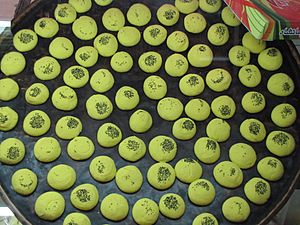Nan-e berenji facts for kids
 |
|
| Type | Cookie |
|---|---|
| Place of origin | |
| Region or state | Kermanshah |
| Main ingredients | Rice flour, Sugar, Egg, Cardamom, Clarified butter |
Nan-e Berenji (Persian: نان برنجي) is a delicious Iranian cookie. It is also known as Shirini Berenji. These cookies are made from rice flour and come from the city of Kermanshah in Iran. The name "Nan-e Berenji" simply means "rice bread" in Persian.
These cookies often have a lovely cardamom flavor. They are usually decorated with tiny poppy seeds. Nan-e Berenji cookies are typically flat and round. Most of the time, they are white, but sometimes they can be a light yellow color.
Celebrating Nowruz with Seven Sweets
There is an old story about King Jamshid from Persia. The legend says he found sugar on the Persian New Year. This special day is called Nowruz. Because of this, people celebrate Nowruz with seven different sweet foods. These sweets are served along with the traditional seven items of the Haft-sin table.
The seven sweet foods often include:
- Noghl: These are almonds covered in sugar.
- Persian Baklava: A sweet pastry with pistachio and almond nuts.
- Nan-e Berenji: These are the tasty rice cookies.
- Nan-e Badami: Cookies made with almonds.
- Nan-e Nokhodchi: Cookies made from chickpea flour.
- Sohan Asali: Honey-coated almonds.
- Nan-e Gerdui: Cookies made with walnuts.
The History of Nan-e Berenji Cookies
The history of Nan-e Berenji goes back about 150 years. This was during the time of the Qajar dynasty in Iran. Back then, many travelers and pilgrims used to pass through Kermanshah. They were traveling along the famous Silk Road. These travelers needed food that would last a long time. They also needed food that would give them energy.
The people of Kermanshah came up with a great idea. They started making sweets using rice. Rice was a main food for many travelers. These rice cookies were perfect because they stayed fresh for a while. They also gave the travelers the nutrients they needed for their long journeys.
See also
 In Spanish: Nan-e berenji para niños
In Spanish: Nan-e berenji para niños
 | Shirley Ann Jackson |
 | Garett Morgan |
 | J. Ernest Wilkins Jr. |
 | Elijah McCoy |

